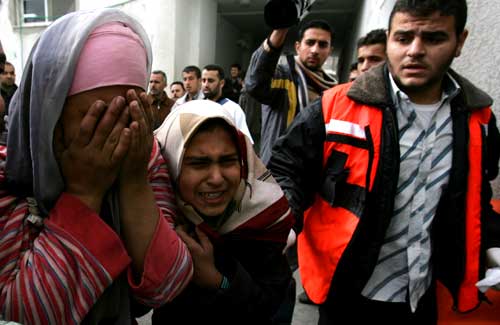Civilians paying high price in Gaza war
 Tel Aviv/Gaza - Human rights organizations are voicing growing concern about civilian deaths in Gaza, not least after Israeli shells landed outside a UN school, killing 42 Palestinians and wounding dozens.
Tel Aviv/Gaza - Human rights organizations are voicing growing concern about civilian deaths in Gaza, not least after Israeli shells landed outside a UN school, killing 42 Palestinians and wounding dozens.
They were among several hundred residents of Gaza's crowded Jabaliya refugee camp who had sought shelter in the neutral UN building, but instead found themselves caught in the single deadliest incident since Israel's Gaza offensive got underway.
Twelve days after Israel began its air campaign and four days after it sent in ground troops, the death toll in Gaza was nearing 700 Wednesday - and the number of civilians among them growing alarmingly.
According to the UN, about half of the total dead are now women and minors.
The actual civilian toll is likely to be higher. Health officials have been unable to establish the number of civilians among the men killed.
Three Israeli civilians have also been killed by Palestinian rockets.
Witnesses said local militants fired mortar shells from near the school at Israeli ground troops stationed a few kilometres outside the crowded camp. Israel said it was returning fire to the source of the mortar attacks.
UNWRA, the UN agency running the school said the building was clearly waving a UN flag and Israel was given the coordinates of all its facilities in Gaza long before the fighting.
"There is no safe haven in Gaza. Look at what happened in Jabaliya yesterday," said UNWRA spokesman Chris Gunness.
"People were told by the Israeli army to leave their homes and sought sanctuary in a neutral UN facility and look at the tragedy that happened," he told Deutsche Presse-Agentur dpa. Israel has clearly taken its gloves off, returning fire to the militants confronting its soldiers wherever they are. Also from the air, it is seeking out Hamas targets wherever they are.
At least six mosques for example have been among the hundreds of targets struck from the air: Israel charges Hamas was hiding some of its large arsenal of rockets in them - confident that it would hold back from attacking houses of worship. But military and political leaders then made a strategic decision that no building was immune, or safe from its attempts to destroy Hamas' rocket arsenal.
Israel has given out advance notices to civilians, warning them to leave areas about to be hit - both by dropping leaflets from helicopters and with pre-recorded telephone messages in broken, Hebrew-accented Arabic, Gaza residents say.
But in the case of the Jabaliya school, residents found themselves caught in the inferno after doing just that: They had fled to the shelter after receiving warnings they would not be safe if they stayed in their houses.
Many in Gaza now say they feel nowhere is safe.
Residents of southern Israel, for their part, say they have not felt safe since rockets from Gaza first started landing randomly and on an almost daily basis in their towns and villages from October 2001.
The Israeli government has gone at lengths to set up alarm systems and build protective shields and shelters in houses, schools, kindergartens - even in the form of small concrete rooms set up in the middle of the street.
As a result, the death toll of the Palestinian rockets over the past seven years has been only a tiny fraction of the deaths in Gaza in just 12 days. It stood at some 32 before the offensive began, though residents say the hardest for them to cope with was the constant trauma and disruption to daily life.
In Gaza, "there are no bomb shelters, no buildings that can shelter people from the violence around them. Nearly 1.5 million civilians are dangerously exposed to the fighting," said Allegra Pacheco of the UN Office for the Coordination of Humanitarian Affairs (OCHA).
The UN was "particularly concerned about children, because every other person in Gaza is a child," she told dpa.
Speaking on condition of anonymity, several Gaza residents expressed fury at both Palestinian militants for putting civilians at risk by firing at Israeli troops from behind and from the roofs of civilian buildings, and at Israel for disregarding their presence when returning fire.
"Hamas does not care about the safety of the population. All that they want is to show Israel that resistance is still there, no matter where they are firing from and no matter what the result is," one Gaza City resident, who asked not to be named for fear of reprisals, said bitterly.
"And at the same time they are blaming Israel of committing massacres against civilians."
Israel says that as long as Hamas is operating from populated areas, it has nowhere else to go after its fighters. It insists that it is trying to be as "surgical" as it can, but that this is tough in an enclave as densely-populated as Gaza.
But the exasperated father of five also had harsh words for Israel. Earlier this week, an Israeli airstrike on a vegetable market on Gaza City's Palestine Square killed seven Palestinians, including one Hamas militant.
"In order to get one Hamas militant, they killed six more civilians," he fumed. Israel must have known it was hitting a market, "but in spite of this, it keeps hitting both Hamas and the civilians." (dpa)